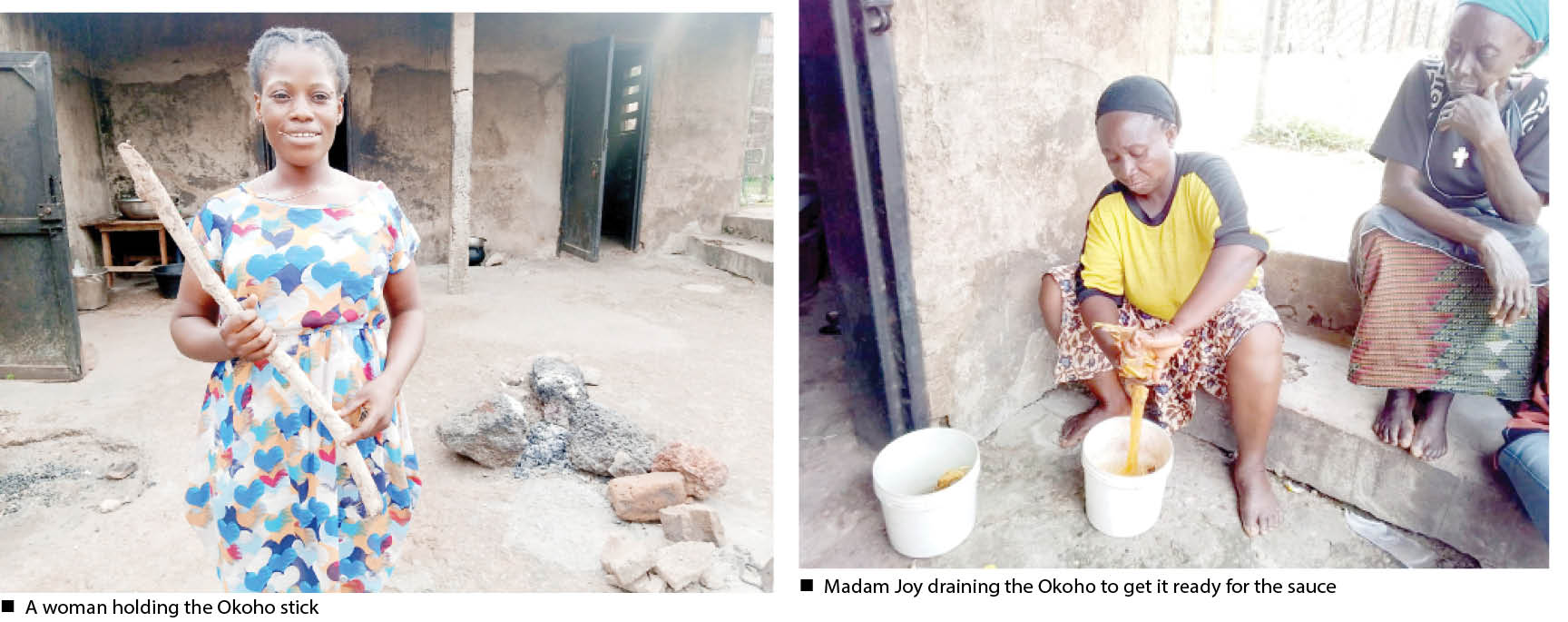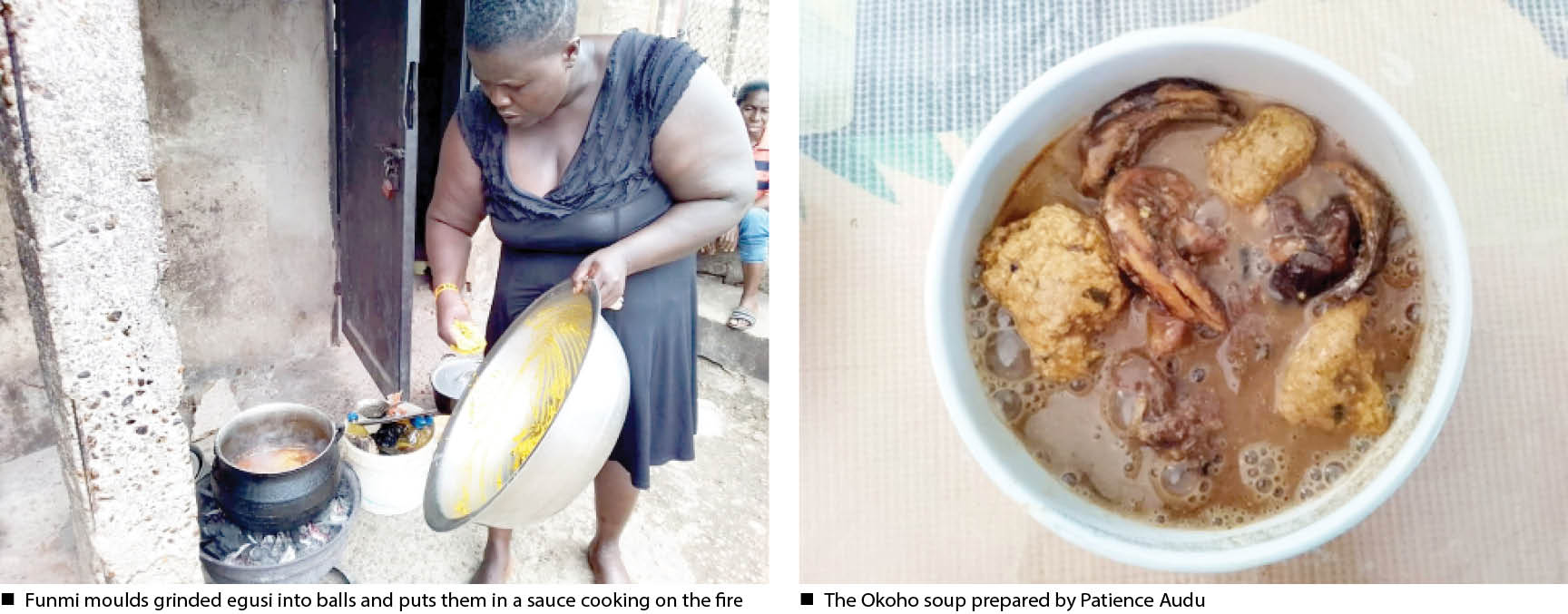“Okoho is not just a meal, but a symbol of our culture and tradition, community, and the bounty of the land. It is a unique soup and I look forward to savouring it whenever I travel to the village.
“I hardly prepare it by myself here in Makurdi because it’s a special delicacy which takes time; and I do not have such time due to my busy schedules, “ says Felicia Ben, an Idoma native.
Okoho is the traditional soup of the Idoma people of Benue State. It is made from the plant called Okoho (Idoma dialect) which belongs to the Amplidaceae (Vitaceae) botanic family.
Certainly, the rich culinary tradition of the Idoma people would not be complete without exploring the savoury and unique Okoho soup – a delicacy made from a distinctive stalk that thickens and draws when cooked.
- Nenadi’s emergence as LP caretaker chair and Abure’s ouster
- How musicians unite Nigerians, cause change through songs
For the Idoma speaking people, the soup is a beloved staple often enjoyed with pounded yam.
The cherished place Okoho soup holds in Idoma cuisine reflects the essence of their cultural identity.
The people of Benue South senatorial district refer to Okoho soup as more than just a dish because it is a vital part of Idoma culture and often prepared during special occasions such as festivals, marriages and communal gatherings.
The preparation and sharing of the soup foster a sense of unity and belonging, as families and neighbours come together to celebrate and enjoy their cherished meal that has been passed down through generations.

Patience Onyeche Audu, a chef at a restaurant in Makurdi, described Okoho soup as a special delicacy that goes well with pounded yam and amala (yam flour).
Audu explained that the process of cooking the native delicacy begins with sourcing fresh Okoho sticks (stalks), which are then soaked in hot water to extract the mucilaginous substance that gives the soup its distinctive texture.
She added that the slimy consistency remains the hallmark of Okoho soup, much like the famous okra or ogbono soups found in other parts of Nigeria, noting, however, that only a few restaurants have it on their menu.
“The making of Okoho soup is an art that has been passed down through generations. You first source for the Okoho stick, scrape it with a knife, then hit it with a pestle to be able to separate it into strands, and tie it as a bunch. Then, soak it in a bowl of hot water and cover for a while. Afterwards, squeeze the stick inside the hot water to extract the slimy liquid/juice from the stick and keep aside.
“The next step is to pound pepper and locust bean (okpehe) together and pour into a pot of water on the fire for the soup, add dried fish into the boiling sauce, then mix ground melon with eggs, mould into small balls and add to the boiling mixture, stir and then add other seasonings and allow it to cook for sometime.
“Then, remove the balls of melon, dried fish, or bush meat to prevent them from scattering while stirring. Bring down the boiling sauce from the fire before pouring the Okoho extract and stir with a small bunch of broom until the liquid is well mixed with the hot sauce. Okoho soup is then ready to be served,” Audu narrated.
She added that Okoho soup is on high demand at her restaurant, and attracts not only the Idoma people, but also Tiv and Yoruba customers, while noting that the key ingredient for Okoho is sourced locally from the market and is affordable.
She concluded that preparing the soup is time-consuming, particularly due to the egusi balls, and that the process of picking Okoho strands can be challenging without fingers, emphasising that the soup is served with pounded yam and costs between N2000 and N3800, depending on the choice of meat or fish.
Corroborating her sister, Esther Audu – another chef tutored our correspondent on the preparation process, explaining further that the extracted substance from the Okoho sticks is usually combined with a variety of locally sourced ingredients, including bush meat, stockfish and assorted meats, which provide a rich base for the soup.
She added that palm oil (optional), locust beans, and traditional spices are added to enhance the flavour, creating a complex and deeply satisfying taste.
In a similar development, Funmi Akinwale, a Yourba lady, who has worked in a restaurant in Makurdi for over 30 years, said, “We prepare Okoho here because a lot of our customers like the soup. The soup is normally prepared within an hour. People from different tribes come here to eat Okoho soup – Igbos, Yorubas, Idoma – and so on.
“These people cut across government workers who come from the government house; business men and politicians of all cadres. We source the ingredients from the market. But, the Okoho is becoming scarce these days. Few days ago, we looked for it at Wadata, Railway and Wurukum markets, but couldn’t find it until we paid a commercial motorcyclist who went elsewhere to get it for us.
“A stick of Okoho costs at least N500. We sell a plate of Okoho soup with pounded yam for N2500 while with semovita, it goes for N2000. We don’t cultivate Okoho because it’s a climbing tree and could spread to neighbouring rooftops. Sometimes, people order large quantity of the soup in advance.”
Food enthusiast, Elizabeth Mohammed, thinks that experimenting with new ingredients and cooking techniques while maintaining the traditional essence of the dish makes one to crave more for Okoho.
She said, “I’m Idoma and like eating Okoho because it’s our native soup. It’s an agelong soup which most people preferred eating from the days it was prepared by their mothers. But restaurants that prepare Okoho soup in Makurdi are rare.
Mohammed further stressed that the fusion of old and new has helped introduce Okoho soup to a broader audience, allowing more people to appreciate its unique ginger flavours and cultural significance.

Consequently, the traditional head of Otukpo Kingdom, Och’Otukpo Odu, Chief John Eimonye, maintained that the plant’s use likely originated from the Idoma people’s migration period, during which they discovered its edibility alongside other wild fruits in the forest, but that there is no known traditional or cultural significance attached to Okoho beyond its culinary use.
“Most of the times, what they put reduces the slimy effect so they carefully choose what they add to the soup. It’s quite healthy with lots of vitamins and better than some of the supplements we take. Those who eat it can testify that in Okoho we have various supplements, including vitamin C.
“Every part of Idoma land eats Okoho but some have preferences of preparing it certain ways. Some dry it, grind and then use it like dry okra. I think the origin can be linked to migration during which our people found out that they ate a lot of uncultivated fruits in the bush like Okoho. They found it in the bush and discovered that it was edible like other fruits in the forest so they started using it. There is no traditional connotation that I know of,” the Otukpo traditional head posited.
David Entonu, a Medical Dietician with the Federal Medical Centre (FMC) Makurdi opined that the plant is valued not only for its culinary applications, but also for its potential medicinal properties, which the Idoma people have harnessed for generations.
He noted that beyond its cultural significance, Okoho soup is also appreciated for its nutritional benefits as the Okoho plant is rich in dietary fibre, which aids digestion, and provides a nourishing meal that supports overall health and wellbeing.
Entonu further explained that, “Okoho soup has a lot of nutritional value, especially in terms of the B group of vitamins and vitamin A. Vitamin A is known to aid the eye in good vision. In the B group of vitamins, vitamin B1 and B9 are more prominent in Okoho to protect the body against disease. It has vitamin D and vitamin C – which is an oxidant that removes free radicals from the body.
“It has vitamin K which is good for the production of blood, it aids in blood formation and also has antioxidants, vital chemicals known as flavournoids and ethanine. It also contains minerals like calcium and potassium. Potassium is good for heart health while calcium is good for formation of bone.
“Generally, it is good for ailments such as venereal disease, sore breast, urinary tract infection and it aids in healing digestive problems. So, it is recommended that one eats it as much as they can because it will aid digestion and reduce diseases.”
For Adakole Inalegwu Daniel, President of the Idoma National Youth Forum, Okoho, also known in English as Cissus Populnea, is a traditional plant-based soup of the Idoma people often referred to as “the pride delicacy of the Idoma people.”
He said the soup is essential at Idoma celebrations and known for its unique aroma, taste, and medicinal properties.
Daniel, however, observed that due to displacement caused by recent insecurity in parts of Idoma land, Okoho has become scarce.

 Join Daily Trust WhatsApp Community For Quick Access To News and Happenings Around You.
Join Daily Trust WhatsApp Community For Quick Access To News and Happenings Around You.

